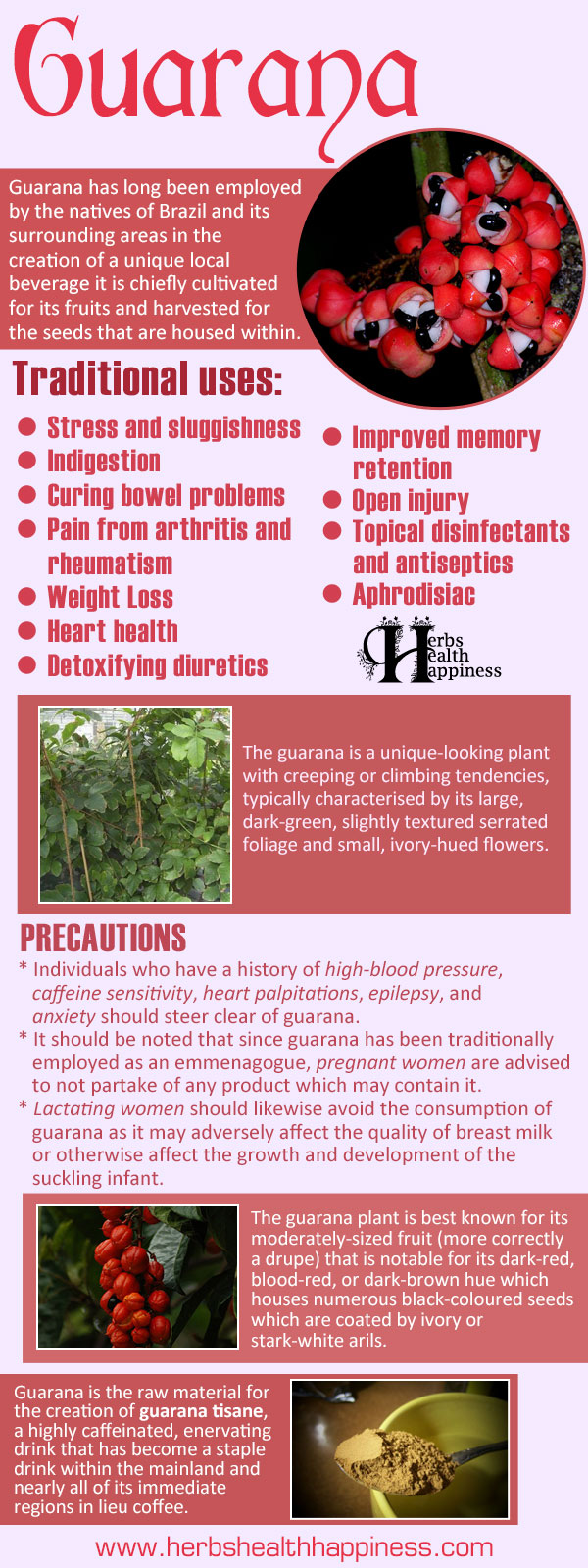Guarana

Guarana Uses and Benefits - image to repin / share
Infographic: herbshealthhappiness.com. Image credits: See foot of article

Guarana - Botany And History
Guarana is a relatively ancient plant which has only fairly recently experienced a slowly-rising mainstream usage in the West. A relatively unknown plant which has only been cultivated and employed in selected areas of the globe (specifically Brazil, the Amazon, and its immediate domains), it later came into global attention sometime in the mid to late 1990s (in spite of being commercialized, at least in Brazilian areas, since prior to the 1960s), when it slowly trickled into mainstream popularity after long endemic use in Brazil, Portugal, and other surrounding areas. Often called Brazilian cocoa or Brazilian cacao, guarana is chiefly made into a beverage - a practice which has been done by the natives of Brazil since time immemorial. A well loved beverage by locals, guarana can be considered Brazil's very own coffee, a claim which is cemented by the fact that guarana contains more potent amounts of caffeine than the regular coffee bean. Initially limited to the consumption and cultivation of natives, guarana was later introduced to Europeans colonizers sometime during the early to mid-18th century. In spite of this relatively old introduction to the general Western sphere, guarana was then a beverage which was more limited to the consumption of locals, never truly being able to eclipse or even best the then more popular coffee bean.
Initially cultivated by the Guarani First Peoples, guarana plays a very integral role in the culture, palate, and tradition of the natives of Brazil, the Amazon, and Paraguay, so much so that it is oftentimes thought of as a comfort food (or a 'comfort beverage', to be exact). The guarana is a unique-looking plant with creeping or climbing tendencies, typically characterised by its large, dark-green, slightly textured serrated foliage and small, ivory-hued flowers. The guarana plant is best known for its moderately-sized fruit (more correctly a drupe) that is notable for its dark-red, blood-red, or dark-brown hue which houses numerous black-coloured seeds which are coated by ivory or stark-white arils. [1]
Guarana - Culinary Uses
Guarana has long been employed by the natives of Brazil and its surrounding areas in the creation of a unique local beverage it is chiefly cultivated for its fruits and harvested for the seeds that are housed within. Guarana is the raw material for the creation of guarana tisane, a highly caffeinated, enervating drink that has become a staple drink within the mainland and nearly all of its immediate regions in lieu coffee (genus Coffea).
Originally widely consumed by the Guarani tribe, the traditional process of brewing involved the harvesting, shelling, washing, and drying of guarana seeds which were then ground into a fine powder and allowed to emulsify. This thick paste (usually of a pastry-dough like consistency) was subsequently kneaded, dried further, and stored for later use. Affectionately called 'guarana bread' by natives and foreign enthusiasts alike, it was originally grated into a container and allowed to infuse with hot water to create a tisane which is characterised for its mellow sweetness - a feature not commonly found in caffeinated beverages. Notable for its extremely high caffeine content (at some 2 - 5%, compared to coffee's meagre 1 - 2%) it is a well-loved and much-consumed beverage, with modern innovations such as sodas and other soft drinks being flavoured with, or even containing the infusion having been incorporated into mainstream consumption. Unlike the caffeine found in coffee or tea, the caffeine in guarana (combined with a slew of other potent, active compounds) is not only found in greater concentrations, but is also said to be far more bioavailable (that is, more readily absorbed and integrated by the body). [2]
Guarana - Herbal Uses
Initially drunk by the natives as both a recreational beverage and as a potent energizer and fatigue buster, guarana is also employed for medicinal purposes. Typically drunk to help combat stress and sluggishness, it has also become popular drink thanks to being prescribed memory and cognition-boosting effects. [3] While the earliest applications involving guarana simply employed it for its enervating effects, soon, other medicinal benefits were attributed to the drink. Traditionally prepared guarana (the ones derived from guarana 'bread') were said to be helpful in promoting proper digestion, curing bowel problems (among them diarrhea, constipation, indigestion, dyspepsia, bloating, and even flatulence), and alleviating symptoms of depression. Guarana has also been attributed emmenagogue, febrifuge, aphrodisiac, and adaptogenic properties. [4]
Very strong decoctions of ground or whole seeds have even been employed as topical disinfectants and antiseptics, while moderately strong infusions of the ground seeds were drunk as an analgesic or otherwise steeped in oil and applied topically as a means to alleviate the pain associated with arthritis and rheumatism. [5] More modern applications for guarana involve its being employed as a weightloss supplement and a metabolic enhancer, while traditionally prepared beverages applied in the modern context have also been used as heart tonics, general tonifying drinks (usually mixed with other nourishing or energizing herbs and / or spices), or as detoxifying diuretics. [6]
Studies have shown that regular moderate consumption of guarana may result in the overall improvement of the human body, with effects which include (but that are not limited to): improved memory retention and faster recall, improved heart health, improved metabolism, and heightened reaction time. [7] Within the traditional context of Guarani shamanic healing systems, very potent decoctions of guarana was also employed as an anticoagulant and as a disinfectant, usually employed as first aid in the event of any open injury. [8] Outside of traditional applications, it's myriad of health benefits have been largely summed up by its being an adaptogenic - that is, a compound which allows the body to quickly adapt to, and counteract the ravages of stress and disease. Guarana has also been ascribed potent antioxidant and antistressant properties due to its high caffeine and moderate theobromine content, making it an excellent supplement for individuals who spend long, stressful hours at work, or for individuals who desire a health boost.
Most modern preparations of guarana are specifically designed to cater to a highly active community, which is why it has become a prime choice for flavouring beverages in Brazil (and, subsequently, the a large part of the Western, and a sizeable part of the Eastern world). Guarana may also come in concentrated "energy shots", tinctures, supplementary tablets or capsules of whole ground seeds or as concentrated extracts. Traditional preparations of guarana have also been made available internationally, although they are typically sold in specialty shops or otherwise made available through online shopping.
Unlike the majority of other medicinal herbs, guarana is chiefly an edible herb, with very little applications outside of its primary role. In spite of its somewhat limited nature, guarana may be "improved upon" when it is mixed with other beneficial herbs or spices for that additional therapeutic "kick". Being a flavourful, versatile, and healthful herb makes it indispensable to one's pantry and medicine chest.
Guarana - Esoteric Uses
While there is no true esoterical use of guarana in the context of modern Western magick, the Guarani tribe has long considered the plant to be sacred chiefly due to its potent energizing properties and its curative benefits.
Initially only gathered for healing or ritualistic purposes, it soon became a staple of the Amazonian tribes. The Satere-Maue tribe believed that guarana was a divine gift from a Divine being as remuneration for accidentally killing a village child. It was said that the eye-like seeds of the guarana came about after the god, remorseful for his murderous action, planted the left and right eye of the deceased separately - the left having been planted in the forest, giving nascence to wild guarana, and the right being planted in the very village where the child has been killed, giving rise to domesticated guarana. Some versions even go so far as to suggest that the child who was killed was the very son of the deity who magically rose from the death in the form of the guarana plant, possibly denoting an early 'mystery religion' within a shamanic framework. [9]
Employing magickal thinking however, the guarana may be employed in an esoterical sense as an empowering and energizing herb. It may be integrated into spellworking that requires a little extra boost, or may otherwise be employed as a talisman that invigorates the bearer. Outside of the theoretical, no current modern magickal uses have been attributed to guarana.
Guarana - Contraindications And Safety
It should be noted that while guarana is an excellent energizer and a powerful immuno-booster, excessive consumption of the beverage may result in unwanted side-effects similar to that which results from excessive intake of coffee. Individuals who have a history of high-blood pressure, caffeine sensitivity, heart palpitations, epilepsy, and anxiety should steer clear of guarana. Likewise, people who are under blood thinning medications, or who are partaking of other herbs such as ginseng, ephedra, mate, or some other enervating beverages should avoid the consumption of guarana lest it result in adverse sideeffects. It should be noted that since guarana has been traditionally employed as an emmenagogue, pregnant women are advised to not partake of any product which may contain it. Lactating women should likewise avoid the consumption of guarana as it may adversely affect the quality of breast milk or otherwise affect the growth and development of the suckling infant.
Guarana - Other Names, Past and Present
Satere-Maue: warana (etymological origin of 'guarana')
Guarani: guara-na (later adapted into Portuguese)
Portuguese: guarana / uaranzeiro / uabano
Spanish: guarana / cupana
French: cacao Bresilien / guarana / quarane
German: guarana kletterstrauch
Dutch: guaranastruik
English: guarana (adapted) / Brazilian cacao / Brazilian cocoa / Zoom (slang terminology originating from popular brand of guarana extract)
Latin (scientific nomenclature): Paullinia cupana / Paullinia crysan
References:
[1] https://en.wikipedia.org/wiki/Guarana
[2] https://www.ataste.eu/en/acai/guarana/
[3] https://www.webmd.com/vitamins-and-supplements/lifestyle-guide-11/supplement-guide-guarana
[4] https://www.elephantos.com/en/smart-shop/magic-herbs/guarana.html
[5] https://www.avalonmagicplants.com/french/nouveau/guarana-powder-100-grams.html
[7] https://altmedicine.about.com/od/completeazindex/a/guarana.htm
Main article researched and created by Alexander Leonhardt.
© herbshealthhappiness.com
Infographic Image Sources:
https://commons.wikimedia.org/wiki/File:Flickr_-_ggallice_-_Guaran%C3%A1_(1).jpg
https://en.wikipedia.org/wiki/File:Guarana.jpg
https://en.wikipedia.org/wiki/File:Guaran%C3%A0_original_do_Brasil.jpg
https://commons.wikimedia.org/wiki/File:Guarana_-_Paullinia_cupana.jpg
(Creative Commons)


1. Famous Chef Sheds 60lbs Researching New Paleo Recipes: Get The Cookbook FREE Here
2. #1 muscle that eliminates joint and back pain, anxiety and looking fat
3. Drink THIS first thing in the morning (3 major benefits)
4. [PROOF] Reverse Diabetes with a "Pancreas Jumpstart"
5. Why Some People LOOK Fat that Aren't
6. Amazing Secret Techniques To Protect Your Home From Thieves, Looters And Thugs
7. The #1 WORST food that CAUSES Faster Aging (beware -- Are you eating this?)
If you enjoyed this page:



























